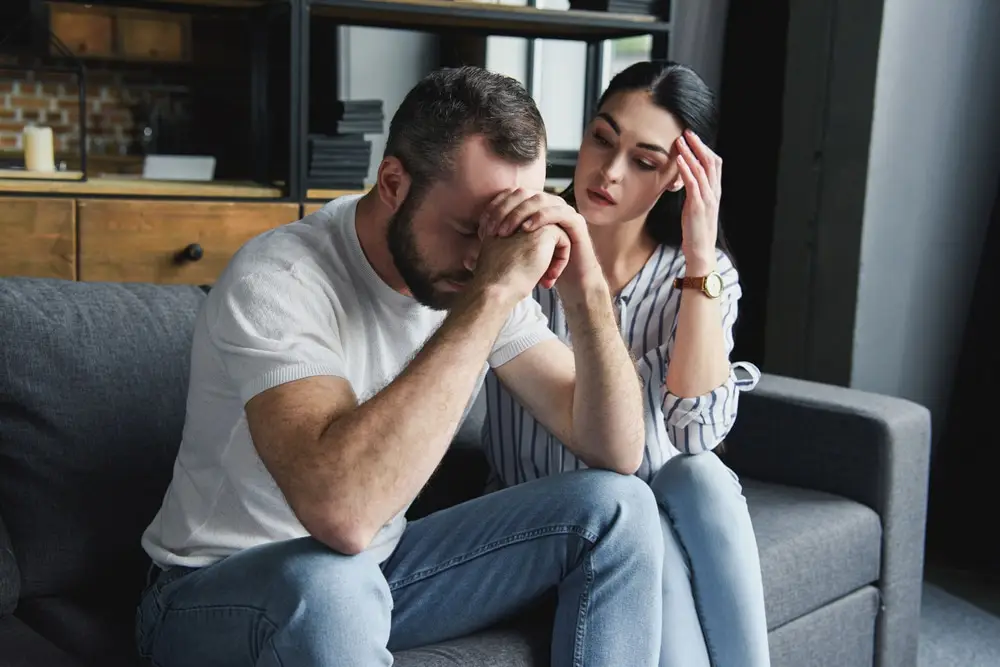You’ve been there, haven’t you? You’ve experienced the pain that comes from a relationship that caused more harm than good. But did you know there’s a way out, a path forward from the darkness? This guide is about that journey – overcoming relationship trauma and finding your way back to life. So let’s dive in and find out how you can heal from relationship trauma.
Contents
What is Relationship Trauma?
 Ever wondered, “What exactly is relationship trauma?” You’re not alone. Relationship trauma is a kind of emotional distress, a deep psychological wound that occurs after experiencing harmful, distressing, or shocking events within a romantic relationship. It’s a broad term, encompassing everything from physical or emotional abuse to betrayal, infidelity, or the sudden loss of a partner.
Ever wondered, “What exactly is relationship trauma?” You’re not alone. Relationship trauma is a kind of emotional distress, a deep psychological wound that occurs after experiencing harmful, distressing, or shocking events within a romantic relationship. It’s a broad term, encompassing everything from physical or emotional abuse to betrayal, infidelity, or the sudden loss of a partner.
These aren’t just bad memories, they’re significant incidents that leave a lasting impact, leading to feelings of fear, helplessness, or even horror. Such events can shake your sense of safety and security, not just in the relationship where the trauma occurred, but in your overall perspective of love, trust, and future relationships.
But the good news? There are ways to heal, and that’s what we’re exploring today. The path toward overcoming relationship trauma is arduous but certainly not impossible. Stick with me, and together, we’ll navigate the way.
Signs & Symptoms Of Relationship Trauma
 Recognizing relationship trauma isn’t always as straightforward as you might think. It often lurks beneath the surface, manifesting itself through various signs and symptoms. So, what should you look out for? Here are some key indicators.
Recognizing relationship trauma isn’t always as straightforward as you might think. It often lurks beneath the surface, manifesting itself through various signs and symptoms. So, what should you look out for? Here are some key indicators.
- Emotional Signs
One of the most apparent signs of relationship trauma is the emotional aftermath. Feelings of sadness, despair, or hopelessness that persist long after the relationship has ended can indicate unresolved trauma. You might also experience intense fear or anxiety, particularly when reminded of the person or incidents from the relationship.
- Physical Symptoms
Believe it or not, your body often reflects your emotional state. Physical symptoms like chronic fatigue, difficulty sleeping, changes in appetite, or even unexplained aches and pains can all be signs of relationship trauma.
- Behavioral Changes
Have you noticed drastic changes in your behavior since the relationship? Perhaps you’re avoiding certain places or people that remind you of your past. Maybe you’ve become withdrawn, losing interest in activities you once enjoyed. Or you could be struggling with trust issues, finding it hard to form new relationships.
- Intrusive Thoughts or Memories
Does your mind replay the distressing events of the relationship over and over again, even when you try to focus on something else? These are called intrusive thoughts or memories, and they’re common signs of relationship trauma.
- Hyperarousal
This is a state of heightened anxiety and sensitivity. You might feel constantly “on edge,” have difficulty concentrating or startle easily. It’s like your body’s alarm system is always “on,” ready for danger at any moment.
Recognizing these signs is the first step toward healing. Remember, it’s okay to ask for help. There’s no shame in seeking support to overcome relationship trauma.
How Can This Affect Your Relationship?
 Relationship trauma can cast a long shadow, influencing your present and future relationships in profound ways. Let’s dive into some of the impacts this trauma can have.
Relationship trauma can cast a long shadow, influencing your present and future relationships in profound ways. Let’s dive into some of the impacts this trauma can have.
- After experiencing trauma, it’s common to struggle with trust issues. You might find it challenging to trust new partners or even those who’ve been in your life for a while.
- A relationship trauma can affect you! Not just physical, but emotional intimacy too. The fear of being vulnerable with another person can be intense if you’ve been hurt before.
- Relationship trauma can make you hyperaware of potential threats in your relationship. This constant state of worry and anxiety can create a tense atmosphere and may lead to frequent conflicts or misunderstandings.
- People who have experienced relationship trauma often blame themselves, which can significantly impact their self-esteem. This lack of self-worth can influence your interactions and relationships, sometimes leading you to accept less than you deserve.
- In some cases, the fear of experiencing trauma again might lead you to avoid relationships altogether.
10 Ways For Overcoming Relationship Trauma

Recovering from relationship trauma is akin to traversing a winding path. There may be stumbling blocks, twists, and turns along the way, but rest assured, every stride you take is a step towards the healing sunshine. Let’s explore the journey more deeply, looking at ten signposts to guide you.
Acknowledge Your Feelings
Imagine you’ve injured your foot. Ignoring the pain won’t make it disappear, would it? Likewise, your emotional pain needs to be acknowledged, not ignored. Your feelings are valid and authentic. Allow yourself to experience the pain, hurt, anger, or any other emotion that surfaces. It’s okay to grieve for what was lost. This recognition of your emotions is the foundational stone of the healing process.
Seek Professional Help
 Imagine you’re lost in a labyrinth. Having a guide who knows the way out would be incredibly helpful, right? Similarly, navigating the maze of emotional healing can be easier with professional help. Therapists, psychologists, and counselors have the tools and techniques to help you understand your feelings, learn coping strategies, and guide you along the healing journey.
Imagine you’re lost in a labyrinth. Having a guide who knows the way out would be incredibly helpful, right? Similarly, navigating the maze of emotional healing can be easier with professional help. Therapists, psychologists, and counselors have the tools and techniques to help you understand your feelings, learn coping strategies, and guide you along the healing journey.
Practice Self-Care
Think of yourself as a gardener tending to a garden. By watering the plants and pulling out the weeds, you help the garden thrive. Similarly, self-care activities are a way of tending to your emotional garden. It could be as simple as reading a favorite book, taking a long bath, enjoying a hobby, or just spending a quiet moment alone. These activities provide solace, comfort, and a sense of stability amid the emotional turbulence.
Maintain a Healthy Lifestyle
The mind and body are like two peas in a pod. They’re intertwined, affecting each other in multiple ways. Regular exercise can help release endorphins, the body’s natural mood lifters. A balanced diet nourishes your body, providing the nutrients necessary for good health. Adequate sleep is vital for the body to heal and rejuvenate. These elements of a healthy lifestyle can boost your emotional health and provide the energy required for the healing journey.
Surround Yourself with Support
Remember the joy of sharing a good laugh with friends, or the comfort of a shoulder to cry on? Just as a tree gains strength from the forest, you can gain strength from the supportive individuals around you. Share your feelings with trusted friends or family members, lean on them when things get tough, and allow them to comfort and uplift you.
Join a Support Group
 There’s a certain comfort in shared experiences. Imagine being in a room where everyone has walked in your shoes. They understand your journey because they’ve been on a similar path. Support groups provide this atmosphere of shared understanding. They’re a safe haven where you can share your story, listen to others, learn from their experiences, and know that you’re not alone in your journey.
There’s a certain comfort in shared experiences. Imagine being in a room where everyone has walked in your shoes. They understand your journey because they’ve been on a similar path. Support groups provide this atmosphere of shared understanding. They’re a safe haven where you can share your story, listen to others, learn from their experiences, and know that you’re not alone in your journey.
Mindfulness and Meditation
Consider your mind as a rambunctious toddler, running amok with thoughts and emotions. Mindfulness and meditation are like gentle caregivers, helping to calm the mind and bring attention to the present. These practices can reduce anxiety, promote relaxation, and offer a serene space amid emotional turmoil.
Journaling
Imagine having a personal sanctuary where you can express your deepest thoughts without judgment. That’s what journaling offers. It’s a quiet refuge where you can pour your feelings onto paper, providing a mirror for your emotions and progress. Journaling can be a cathartic process, providing clarity and therapeutic relief.
Establish Boundaries
Boundaries are like invisible fences for your emotional well-being, protecting you from potential harm. As you heal, it’s essential to learn how to set these boundaries in your relationships. They help define what you’re comfortable with, ensuring your emotional safety and providing a sense of control over your interactions.
Be Patient with Yourself
Consider healing as a beautiful sunrise. It doesn’t occur in an instant but gradually illuminates the dark sky. Be patient with yourself as you navigate this journey. Healing doesn’t happen overnight. Celebrate the small victories, forgive yourself for the setbacks, and remember that every step, no matter how small, is a step toward healing.
These ten strategies provide a roadmap for overcoming relationship trauma. Remember, you don’t have to walk this path alone. Support is available!
Conclusion
Overcoming relationship trauma may seem like a monumental task, but remember, you’re stronger than you think. And with time, support, and the right tools, you can navigate your way towards healing, resilience, and ultimately, towards healthier and happier relationships.
Remember, healing takes time, and it’s okay to move at your own pace. Celebrate every step forward, no matter how small, because every step brings you closer to overcoming your relationship trauma.
Relationships are complex, and it’s natural for issues to arise along the way. If you have any queries regarding Relationship Counseling experienced therapists at CoupleMantra can help: Book a trial couple therapy session


